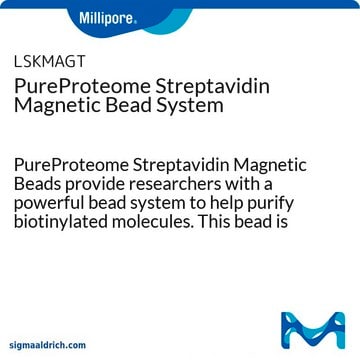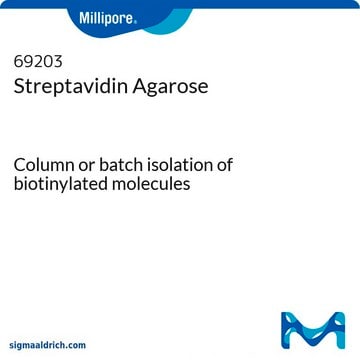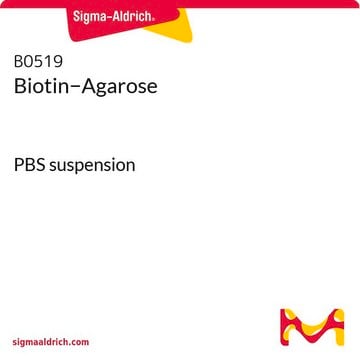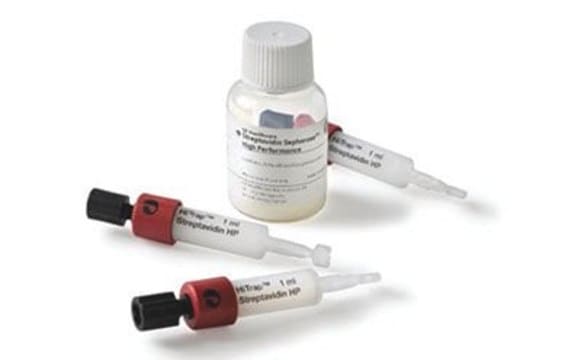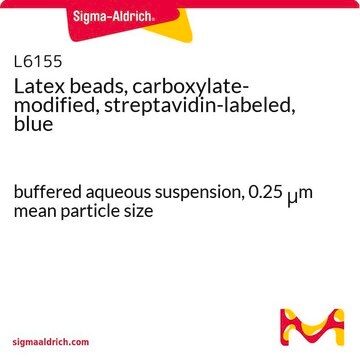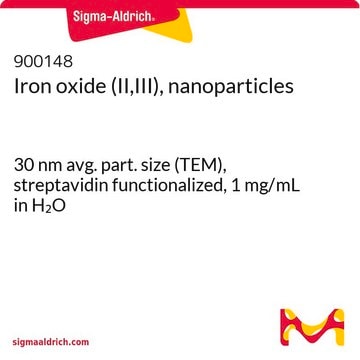STREPMAG-RO
Roche
Streptavidin Magnetic Particles
suspension
Synonym(s):
magnetic particles, streptavidin
Sign Into View Organizational & Contract Pricing
All Photos(1)
About This Item
UNSPSC Code:
12352202
Recommended Products
form
suspension
packaging
pkg of 10 mL (11641786001)
pkg of 2 mL (11641778001)
manufacturer/tradename
Roche
shipped in
wet ice
storage temp.
2-8°C
General description
The Streptavidin Magnetic Particles are polydisperse paramagnetic particles that are designed for the fast separation of a variety of biotin-labeled molecules. The particles are supplied in a suspension that contains 10mg particles per ml in 50mM Hepes, 0.1% bovine serum albumin (BSA), 0.01% methyl-isothiazolone, pH 7.4.
Binding capacities per mg streptavidin magnetic particles:
>=1800 pmol free biotin
>150 pmol biotin-labeled oligonucleotide
>10 pmol biotin-labeled dsDNA fragment
Binding capacities per mg streptavidin magnetic particles:
>=1800 pmol free biotin
>150 pmol biotin-labeled oligonucleotide
>10 pmol biotin-labeled dsDNA fragment
Application
The Streptavidin Magnetic Particles are polydisperse paramagnetic particles that are designed for the fast separation of a variety of biotin-labeled molecules. The particles are supplied in a suspension that contains 10 mg particles per ml. The magnetic separation of biotin-labeled molecules has been successfully employed in a wide range of applications.
Other Notes
For life science research only. Not for use in diagnostic procedures.
Signal Word
Warning
Hazard Statements
Precautionary Statements
Hazard Classifications
Skin Sens. 1
Storage Class Code
12 - Non Combustible Liquids
WGK
WGK 1
Flash Point(F)
No data available
Flash Point(C)
No data available
Certificates of Analysis (COA)
Search for Certificates of Analysis (COA) by entering the products Lot/Batch Number. Lot and Batch Numbers can be found on a product’s label following the words ‘Lot’ or ‘Batch’.
Already Own This Product?
Find documentation for the products that you have recently purchased in the Document Library.
Customers Also Viewed
Martin Schatte et al.
Bioconjugate chemistry, 27(6), 1484-1492 (2016-05-18)
Enzymes able to ligate biomolecules are emerging tools to generate site-specific bioconjugates. In this study we present a detection and screening method for bioconjugating enzymes which overcomes limitations of analytical methods such as HPLC or MS. These techniques are experimentally
Debolina Ray et al.
Cancer biology & therapy, 13(10), 848-857 (2012-07-13)
Stress treatment generally causes the post-translational modification and accumulation of the p53 protein, although the role of these aspects has not been always understood in relation to this protein's tumor suppressor activity. We analyzed these attributes of p53 in eight
Matthew T Balmer et al.
Cancer biology & therapy, 15(8), 1000-1012 (2014-05-08)
The chemotherapeutic agents doxorubicin (dox) or 5-fluorouracil (5FU) are used to treat cancer cells as they cause irreparable DNA damage, inducing these aberrant cells to undergo cell death. The mediator of this process is presumed to be in part the
Our team of scientists has experience in all areas of research including Life Science, Material Science, Chemical Synthesis, Chromatography, Analytical and many others.
Contact Technical Service